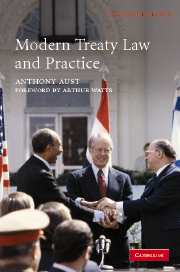Book contents
- Frontmatter
- Contents
- Foreword to the first edition by Sir Arthur Watts
- Preface to the second edition
- Articles of the Convention cited in the text
- Table of treaties
- Table of MOUs
- Table of cases
- Glossary of legal terms
- List of abbreviations
- Introduction
- 1 Vienna Convention on the Law of Treaties 1969
- 2 What is a treaty?
- 3 MOUs
- 4 Capacity to conclude treaties
- 5 Full powers
- 6 Adoption and authentication
- 7 Consent to be bound
- 8 Reservations
- 9 Entry into force
- 10 Treaties and domestic law
- 11 Territorial application
- 12 Successive treaties
- 13 Interpretation
- 14 Third states
- 15 Amendment
- 16 Duration and termination
- 17 Invalidity
- 18 The depositary
- 19 Registration and publication
- 20 Dispute settlement and remedies
- 21 Succession to treaties
- 22 International Organisations
- 23 Drafting and final clauses
- Appendices
- Index
14 - Third states
- Frontmatter
- Contents
- Foreword to the first edition by Sir Arthur Watts
- Preface to the second edition
- Articles of the Convention cited in the text
- Table of treaties
- Table of MOUs
- Table of cases
- Glossary of legal terms
- List of abbreviations
- Introduction
- 1 Vienna Convention on the Law of Treaties 1969
- 2 What is a treaty?
- 3 MOUs
- 4 Capacity to conclude treaties
- 5 Full powers
- 6 Adoption and authentication
- 7 Consent to be bound
- 8 Reservations
- 9 Entry into force
- 10 Treaties and domestic law
- 11 Territorial application
- 12 Successive treaties
- 13 Interpretation
- 14 Third states
- 15 Amendment
- 16 Duration and termination
- 17 Invalidity
- 18 The depositary
- 19 Registration and publication
- 20 Dispute settlement and remedies
- 21 Succession to treaties
- 22 International Organisations
- 23 Drafting and final clauses
- Appendices
- Index
Summary
Who is the third who walks always beside you?
In relation to a treaty, a third state is ‘a state not a party to the treaty’ (Article 2(1)(h)). A range of states falls within this definition, from one which is not eligible to become a party, to a state which has ratified but for which the treaty is not yet in force. Third states should not be confused with objects of international law, such as corporations and individuals. Although some treaties confer important rights on them, that does not make them third parties. Although the rules in the Convention rest firmly on the sovereignty and independence of states, similar rules apply in the law of contract, and, as with them, the third state probably has to be identifiable either by name or as a member of a certain class or as answering to a particular description. (For the situation when an international organisation – either alone or with some or all of its Member States – is party to a treaty, see pages 417–19 below.)
General rule
The general rule is rather obvious: a treaty does not create either obligations or rights for a third state without its consent (Article 34). Thus a treaty, whether bilateral or multilateral, cannot, by its own force, impose an obligation on a third state, nor modify in any way the legal rights of a third state without its consent.
- Type
- Chapter
- Information
- Modern Treaty Law and Practice , pp. 256 - 261Publisher: Cambridge University PressPrint publication year: 2007
- 1
- Cited by



